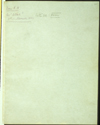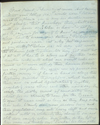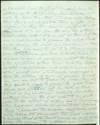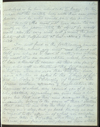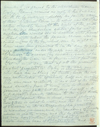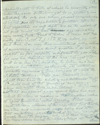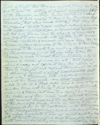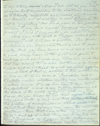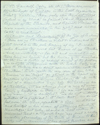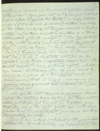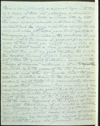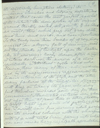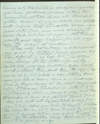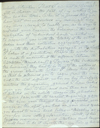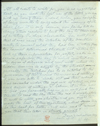Mahatma Letter No. 49: Difference between revisions
No edit summary |
No edit summary |
||
| (20 intermediate revisions by 3 users not shown) | |||
| Line 1: | Line 1: | ||
{{Infobox MLbox | {{Infobox MLbox | ||
| header1 = People involved | | | header1 = People involved | | ||
| Line 10: | Line 7: | ||
| writtendate = unknown | | writtendate = unknown | ||
| receiveddate = March 3, 1882 | | receiveddate = March 3, 1882 | ||
| otherdate = | | otherdate = unknown | ||
| header3 = Places | | header3 = Places | ||
| sentfrom = unknown | | sentfrom = unknown | ||
| receivedat = [[Allahabad, India]] | | receivedat = [[Allahabad, India]] | ||
| vialocation = | | vialocation = unknown{{pad|9em}} | ||
}} | }} | ||
''' | This is '''Letter No. 49''' in''' [[The Mahatma Letters to A. P. Sinnett (book)|''The Mahatma Letters to A. P. Sinnett'']], 4th chronological edition'''. It corresponds to '''Letter No. 48''' in '''Barker numbering.''' See below for [[Mahatma Letter No. 49#Context and background|Context and background]]. | ||
<br> | <br> | ||
<br> | <br> | ||
| Line 47: | Line 44: | ||
{{Col-begin|width=98%}} | {{Col-begin|width=98%}} | ||
{{Col-break|width=55%}} | {{Col-break|width=55%}} | ||
Good friend, I "know" — of course. And knowing, without your telling me I would, were I but authorized to influence you in any one direction — answer most gladly: "that knowledge thou shalt share with me some day." When, or how — "is not for me to say, nor for myself to know," as you, aye, you alone, have to weave your destiny. Perhaps soon and perchance — never: but why feel "despairing," or even doubting? Believe me: we may yet walk along the arduous path together. We may yet meet: but if at all, it has to be along and on — those "adamantine rocks with which our [[occultism|occult]] rules surround us" — never outside them, however bitterly we may complain. No, never can we pursue our further journey — if hand in hand — along that high-way, crowded thoroughfare, which encircles them, and on which [[Spiritualism|Spiritualists]] and [[mysticism|mystics]], prophets and [[seer]]s elbow each other now-a-day. Yea, verily, the motley crowd of candidates may shout for an eternity to come, for the Sesam to open | Good friend, I "know" — of course. And knowing, without your telling me I would, were I but authorized to influence you in any one direction — answer most gladly: "that knowledge thou shalt share with me some day." When, or how — "is not for me to say, nor for myself to know," as you, aye, you alone, have to weave your destiny. Perhaps soon and perchance — never: but why feel "despairing," or even doubting? Believe me: we may yet walk along the arduous path together. We may yet meet: but if at all, it has to be along and on — those "adamantine rocks with which our [[occultism|occult]] rules surround us" — never outside them, however bitterly we may complain. No, never can we pursue our further journey — if hand in hand — along that high-way, crowded thoroughfare, which encircles them, and on which [[Spiritualism|Spiritualists]] and [[mysticism|mystics]], prophets and [[seer]]s elbow each other now-a-day. Yea, verily, the motley crowd of candidates may shout for an eternity to come, for the Sesam to open: it never will, so long as they keep outside those rules. Vainly do your modern seers and their prophetesses, creep into every cleft and crevice without outlet or continuity they chance to see; and still more vainly, when once within do they lift up their voices and loudly cry: "Eureka! We have gotten | ||
{{Col-break|width=3%}} | {{Col-break|width=3%}} | ||
| Line 99: | Line 96: | ||
{{Col-begin|width=98%}} | {{Col-begin|width=98%}} | ||
{{Col-break|width=55%}} | {{Col-break|width=55%}} | ||
No. 2, is penned by the Manchester [[Seer]] — [[William Oxley|Oxley]]. Having received no reply to his summons to [[K.H.]], he criticises — mildly so far — | No. 2, is penned by the Manchester [[Seer]] — [[William Oxley|Oxley]]. Having received no reply to his summons to [[K.H.]], he criticises — mildly so far — the utterances of that "Internal Power" — for which new title I feel rather obliged to him. At the sight of the gentle rebuke, our blunderbuss Editor failed not to explode. Nor would she be soothed, until [[Djwal-Khul]], with whom the famous review was concocted — (one by-the-bye, which seen by, ought to have never been permitted to see the day by you) — was authorized, under the safe nom-de-plume of "Reviewer" to answer (by correcting some of his blunders) the Seer, in a few innocent foot-notes. Yet, I must say, that of all the present English "prophets," W. Oxley is the only one who has an inkling of truth; hence the only one calculated to effectually help our movement. The man runs constantly in and out of the straight road, deviating from it every time he thinks he perceives a new path; but finding himself in a cul-de-sac as invariably returns to the right direction. I must admit, there is much sound philosophy here and there in what he writes; and, though his story of "Busiris" in its anthropomorphic presentation is ridiculous nonsense, and, his rendering of [[Sanskrit]] names is mostly wrong; and though he seems to have but very hazy notions about what he calls the "astro-masonic basis of [[Bhagavad Gita (book)|Bhagavat Gita]] and — | ||
{{Col-break|width=3%}} | {{Col-break|width=3%}} | ||
| Line 111: | Line 108: | ||
* '''"The famous review"''' was published by [[Djual Khool]] in [http://www.iapsop.com/archive/materials/theosophist/theosophist_v3_n27_december_1881.pdf# ''The Theosophist'', vol 3, December 1881 (p. 62)]. | * '''"The famous review"''' was published by [[Djual Khool]] in [http://www.iapsop.com/archive/materials/theosophist/theosophist_v3_n27_december_1881.pdf# ''The Theosophist'', vol 3, December 1881 (p. 62)]. | ||
* '''cul-de-sac''' is a French expression for a dead end, or a place from which there is no exit. | * '''cul-de-sac''' is a French expression for a dead end, or a place from which there is no exit. | ||
*'''"Busiris"''' was a | *'''"Busiris"''' was a name of spirit who claimed to be the author of all Mahabharata (including Bhagavad-Gita), claimed to be in communication with W. Oxley through some mediums and who himself declared (through a one medium) that "I can answer for five thousand years of time, for I was then on earth". | ||
*'''NOTE:''' in the phrase that begins '''"astro-masonic basis''' there is no closing quotation mark in this page or the next. A simple omission by the writer. | |||
{{Col-end}} | {{Col-end}} | ||
| Line 118: | Line 116: | ||
{{Col-begin|width=98%}} | {{Col-begin|width=98%}} | ||
{{Col-break|width=55%}} | {{Col-break|width=55%}} | ||
[[Mahabharata (book)|Mahabharata]] to both of which he evidently attributes the same author — yet he is positively and absolutely the only one, whose general comprehension of Spirit, and its capabilities and functions after the first separation, we call [[death]], are on the whole if not quite correct, at least approximating very nearly | [[Mahabharata (book)|Mahabharata]] to both of which he evidently attributes the same author — yet he is positively and absolutely the only one, whose general comprehension of Spirit, and its capabilities and functions after the first separation, we call [[death]], are on the whole if not quite correct, at least approximating very nearly truth. Read it, when it comes out, especially Par. 3, Col. I, page 152 et seq, where you will find them. You may then understand, why, instead of answering your direct question I go into a subject, so far, perfectly indifferent to you. Follow, for instance his definition of the term "Angel" (it will be on line 30,) and try to follow and comprehend his thought, so clumsily yet withal so correctly expressed and then, compare it with the Tibetan teaching. Poor, poor Humanity, when shalt thou have the whole and unadulterated Truth! Behold, each of the "privileged" ones saying: "I alone am right! There is no lacuna. . . ." | ||
No; none: — not on that one special page opened before him, and which he alone is reading in the endless volume of "Spirit Revelation," called Seership. But why such stubborn oblivion of the important fact that there are other and innumerable pages before and after that one solitary page that each of the "[[Seer]]s" has so far hardly learnt to decipher? Why is it, that every one of those "Seers" believes himself the Alpha and the Omega of Truth? Thus | No; none: — not on that one special page opened before him, and which he alone is reading in the endless volume of "Spirit Revelation," called Seership. But why such stubborn oblivion of the important fact that there are other and innumerable pages before and after that one solitary page that each of the "[[Seer]]s" has so far hardly learnt to decipher? Why is it, that every one of those "Seers" believes himself the Alpha and the Omega of Truth? Thus | ||
| Line 138: | Line 136: | ||
{{Col-begin|width=98%}} | {{Col-begin|width=98%}} | ||
{{Col-break|width=55%}} | {{Col-break|width=55%}} | ||
— [[Stainton Moses|S.M.]] is taught that there are no such "Beings" as [[Brothers]], and to reject the doctrine of frequent annihilation and that of the [[Elementary]] and of the [[elemental|non-human Spirits]]. [[Edward Maitland|Maitland]] and [[Anna Kingsford|Mrs. K.]] have revealed to them — by [[Jesus]] and [[God|GOD]] themselves (that alone would beat [[Imperator|+]]) that many of the supposed "[[Spirit Guides|Spirits]]" which control [[mediumship|mediums]] and converse with visitors — [[Spiritualism|Spiritualists]], are no "disembodied" spirits at all, but only "flames," — and the reliquiae of dogs, cats and pigs, helped to communicate with mortals by [[elementals|the spirits of "trees," vegetables and minerals]]. Though more hazy than the human, cautious discourses of the alleged [[Imperator|+]] those teachings are nearer to the mark than anything uttered so far by the [[mediumship|mediums]], and I will tell you why. When the "[[Seer]]ess" is made to reveal that "immortality is by no means a matter of course for all" . . . that "[[soul]]s shrink away and expire," it being the nature of them to burn out and expand themselves" . . . etc., she is delivering herself of actual, incontrovertible facts. And why? Because both [[Edward Maitland|Maitland]] and herself as well as their circle — are strict [[vegetarianism|vegetarians]], while S.M. is a flesh-eater and a wine and liquor drinker. Never will the Spiritualists find reliable, trustworthy mediums and Seers (not even to a degree) so long as the latter and their "circle" will saturate themselves with animal blood, and the millions of infusoria of the fermented fluids. Since my return I found it impossible for me to breathe — even in the atmosphere of the Headquarters! [[Morya|M.]] had to interfere, and to force the whole household to give up meat; and they had, all of them, to be purified and thoroughly cleansed with various disinfecting drugs before I could even help myself | — [[Stainton Moses|S.M.]] is taught that there are no such "Beings" as [[Brothers]], and to reject the doctrine of frequent annihilation and that of the [[Elementary]] and of the [[elemental|non-human Spirits]]. [[Edward Maitland|Maitland]] and [[Anna Kingsford|Mrs. K.]] have revealed to them — by [[Jesus]] and [[God|GOD]] themselves (that alone would beat [[Imperator|+]]) that many of the supposed "[[Spirit Guides|Spirits]]" which control [[mediumship|mediums]] and converse with visitors — [[Spiritualism|Spiritualists]], are no "disembodied" spirits at all, but only "flames," — and the reliquiae of dogs, cats and pigs, helped to communicate with mortals by [[elementals|the spirits of "trees," vegetables and minerals]]. Though more hazy than the human, cautious discourses of the alleged [[Imperator|+]] those teachings are nearer to the mark than anything uttered so far by the [[mediumship|mediums]], and I will tell you why. When the "[[Seer]]ess" is made to reveal that "immortality is by no means a matter of course for all" . . . that "[[soul]]s shrink away and expire," it being "the nature of them to burn out and expand themselves" . . . etc., she is delivering herself of actual, incontrovertible facts. And why? Because both [[Edward Maitland|Maitland]] and herself as well as their circle — are strict [[vegetarianism|vegetarians]], while S.M. is a flesh-eater and a wine and liquor drinker. Never will the Spiritualists find reliable, trustworthy mediums and Seers (not even to a degree) so long as the latter and their "circle" will saturate themselves with animal blood, and the millions of infusoria of the fermented fluids. Since my return I found it impossible for me to breathe — even in the atmosphere of the Headquarters! [[Morya|M.]] had to interfere, and to force the whole household to give up meat; and they had, all of them, to be purified and thoroughly cleansed with various disinfecting drugs before I could even help myself | ||
{{Col-break|width=3%}} | {{Col-break|width=3%}} | ||
| Line 149: | Line 147: | ||
* '''reliquiae''' is a term for remains or relics. | * '''reliquiae''' is a term for remains or relics. | ||
* '''infusoria''' is a term for tiny microorganisms that live in water. | * '''infusoria''' is a term for tiny microorganisms that live in water. | ||
* '''"burn out and expand themselves"''' would make more sense as '''"burn out and expend themselves."''' This is probably a spelling error of the writer. | |||
{{Col-end}} | {{Col-end}} | ||
| Line 179: | Line 178: | ||
P.B. Randolf, [[William Oxley|Oxley]], etc., etc.: "there are secret [[Brotherhood of Adepts|Brotherhoods]] of Initiates in the East, especially in Tibet and Tartary; there only can the LOST WORD (which is no Word) be found". And, there are [[Elemental|Spirits of the Elements]], and Spirit-Flames, that were never incarnated (in this cycle), and immortality is conditional. | P.B. Randolf, [[William Oxley|Oxley]], etc., etc.: "there are secret [[Brotherhood of Adepts|Brotherhoods]] of Initiates in the East, especially in Tibet and Tartary; there only can the LOST WORD (which is no Word) be found". And, there are [[Elemental|Spirits of the Elements]], and Spirit-Flames, that were never incarnated (in this cycle), and immortality is conditional. | ||
[[Mediumship|Mediums]] and [[clairvoyance|clairvoyants]], | [[Mediumship|Mediums]] and [[clairvoyance|clairvoyants]], [of the type of [[Stainton Moses|S. Moses]];] [say] "there are no [[Brother]]s in Tibet or India, and the 'Lost Word' is in the sole keeping of my '[[Spirit Guide|Guardian]]' who knows the word but knows of no Brothers. And, immortality is for all and unconditional, there being no Spirits but the human and the disembodied, etc. etc." — a system of radical denial of the first one and in complete antagonism with it. While [[William Oxley|Oxley]] and [[Mary Hollis Billing|Mrs. H. Billing]] are in direct communication with the "Brothers," [[William Stainton Moses|S.M.]] rejects the very idea of one. While "Busiris" is an "angel" au pluriel, or the Spirit of a congeries of Spirits ([[Dhyan Chohans]]) the [[Imperator|+]] is the [[soul]] of a disembodied Sage solo. His teachings are authoritative, yet we always find a ring of uncertainty and hesitation in them: "We are not able to say now" . . . "It is doubtful" . . . "We do not understand whether it is pretended" . . . it "seems that" . . . "we do not feel sure," etc. Thus speaketh a man, conditioned and limited in his means of obtaining absolute knowledge; but why should a "Soul within the [[Ālaya|Universal Soul]]" a "Spirit Sage" use such a cautious, uncertain phraseology if the truth is known to him? Why not, in answer to her direct, fearless, and | ||
{{Col-break|width=3%}} | {{Col-break|width=3%}} | ||
| Line 189: | Line 188: | ||
'''NOTES:''' | '''NOTES:''' | ||
* '''Paschal Beverly Randolph''' (1825-1875) was an American medical doctor, Spiritualist, and writer. | * '''Paschal Beverly Randolph''' (1825-1875) was an American medical doctor, Spiritualist, and writer. | ||
* '''NOTE:''' the use of square brackets in '''[of the type of S. Moses;]''' reflects the writer's use of brackets, and is not an editor's addition. The next use of brackets '''[say]''' <u>is</u> an editorial comment by [[A. T. Barker]]. | |||
* '''au pluriel''' is French for "in the plural." | * '''au pluriel''' is French for "in the plural." | ||
* '''congeries''' is an aggregation or collection. | * '''congeries''' is an aggregation or collection. | ||
| Line 198: | Line 198: | ||
{{Col-begin|width=98%}} | {{Col-begin|width=98%}} | ||
{{Col-break|width=55%}} | {{Col-break|width=55%}} | ||
challenging remark: "You want objective proof of the [[Brotherhood of Adepts|Lodge]]? Have you not [[Imperator|+]]? and can you not ask him whether I speak the truth?" — why not answer — (if it is + who answers) — either one way or the other, and say: — "the poor wench is hallucinated"; or, (as there cannot be another or a third alternative if [[Stainton Moses|S.M.]] is right) "she lies intentionally, with such and such an object, beware of her! "Why so hazy? — Aye, verily, because "he (+) knows," and "his name be blessed," — but he (S.M.) knoweth not; for, as his "spirits," + he thinks — repeatedly remind him: "You do not appear to have gathered rightly what we said . . ." controversy stirs up your mind and feeling, and in place of a transparent medium, gives us one that is turpid. . . . we require a passive mind, and cannot act without it" . . . (see Light February 4th). | challenging remark: "You want objective proof of the [[Brotherhood of Adepts|Lodge]]? Have you not [[Imperator|+]]? and can you not ask him whether I speak the truth?" — why not answer — (if it is + who answers) — either one way or the other, and say: — "the poor wench is hallucinated"; or, (as there cannot be another or a third alternative if [[Stainton Moses|S.M.]] is right) "she lies intentionally, with such and such an object, beware of her!" Why so hazy? — Aye, verily, because "he (+) knows," and "his name be blessed," — but he (S.M.) knoweth not; for, as his "spirits," + he thinks — repeatedly remind him: "You do not appear to have gathered rightly what we said . . ." controversy stirs up your mind and feeling, and in place of a transparent medium, gives us one that is turpid. . . . we require a passive mind, and cannot act without it" . . . (see Light February 4th). | ||
As we do not "require a passive mind" but on the contrary are seeking for those most active, which can put two and two together once that they are on the right scent, we will, if you please, drop the subject. Let your mind work out the problem for itself. | As we do not "require a passive mind" but on the contrary are seeking for those most active, which can put two and two together once that they are on the right scent, we will, if you please, drop the subject. Let your mind work out the problem for itself. | ||
| Line 254: | Line 254: | ||
{{Col-begin|width=98%}} | {{Col-begin|width=98%}} | ||
{{Col-break|width=55%}} | {{Col-break|width=55%}} | ||
having only the consistency of vapour, — yourself you may, perchance, perceive in them the unexpected solution of an old, blurred, forgotten "dream" of yours, which once recalled will impress itself in an indelible image upon your outer from your inner memory, to never fade out from it again. All this is possible and may happen; for our ways are the ways of " | having only the consistency of vapour, — yourself you may, perchance, perceive in them the unexpected solution of an old, blurred, forgotten "dream" of yours, which once recalled will impress itself in an indelible image upon your outer from your inner memory, to never fade out from it again. All this is possible and may happen; for our ways are the ways of "madmen" . . . | ||
Then why feel "unhappy" and "disappointed"? My good, my faithful friend, remember that hope deferred is no hope lost. "Conditions" may change for the better — for we too — spook-like need our conditions, and can hardly work without them; and then, the vague depression of Spirit, which is now settling down upon you like a heavy cloud on a landscape may be blown away at the first favourable breeze. [[Bhavani Rao|Bhavani Shanker]] is with [[Henry Steel Olcott|O.]], and he is stronger and fitter in many a way more than [[Damodar K. Mavalankar|Damodar]] or even our mutual "female" friend. | Then why feel "unhappy" and "disappointed"? My good, my faithful friend, remember that hope deferred is no hope lost. "Conditions" may change for the better — for we too — spook-like need our conditions, and can hardly work without them; and then, the vague depression of Spirit, which is now settling down upon you like a heavy cloud on a landscape may be blown away at the first favourable breeze. [[Bhavani Rao|Bhavani Shanker]] is with [[Henry Steel Olcott|O.]], and he is stronger and fitter in many a way more than [[Damodar K. Mavalankar|Damodar]] or even our mutual "female" friend. | ||
| Line 360: | Line 360: | ||
== Notes == | == Notes == | ||
<references/> | <references/> | ||
[[Category:ML from Koot Hoomi]] | |||
[[Category:ML to A. P. Sinnett]] | |||
[[Category:ML with images]] | |||
[[Category:ML missing images]] | |||
[[Category:ML missing images 1882]] | |||
[[Category:ML needs commentary]] | |||
[[it:Lettera dei Mahatma n° 48]] | [[it:Lettera dei Mahatma n° 48]] | ||
[[es:CM49]] | |||
Latest revision as of 10:34, 27 July 2022
| Quick Facts | |
|---|---|
| People involved | |
| Written by: | Koot Hoomi |
| Received by: | A. P. Sinnett |
| Sent via: | unknown |
| Dates | |
| Written on: | unknown |
| Received on: | March 3, 1882 |
| Other dates: | unknown |
| Places | |
| Sent from: | unknown |
| Received at: | Allahabad, India |
| Via: | unknown |
This is Letter No. 49 in The Mahatma Letters to A. P. Sinnett, 4th chronological edition. It corresponds to Letter No. 48 in Barker numbering. See below for Context and background.
< Prev letter chrono
Next letter chrono >
< Prev letter Barker
Next letter Barker >
Cover sheet
|
Received Allahabad, March 3rd, 1882. |
NOTES: |
Page 1 transcription, image, and notes
|
Good friend, I "know" — of course. And knowing, without your telling me I would, were I but authorized to influence you in any one direction — answer most gladly: "that knowledge thou shalt share with me some day." When, or how — "is not for me to say, nor for myself to know," as you, aye, you alone, have to weave your destiny. Perhaps soon and perchance — never: but why feel "despairing," or even doubting? Believe me: we may yet walk along the arduous path together. We may yet meet: but if at all, it has to be along and on — those "adamantine rocks with which our occult rules surround us" — never outside them, however bitterly we may complain. No, never can we pursue our further journey — if hand in hand — along that high-way, crowded thoroughfare, which encircles them, and on which Spiritualists and mystics, prophets and seers elbow each other now-a-day. Yea, verily, the motley crowd of candidates may shout for an eternity to come, for the Sesam to open: it never will, so long as they keep outside those rules. Vainly do your modern seers and their prophetesses, creep into every cleft and crevice without outlet or continuity they chance to see; and still more vainly, when once within do they lift up their voices and loudly cry: "Eureka! We have gotten |
NOTES:
|
Page 2
|
a Revelation from the Lord!" — for verily have they nothing of the kind. They have disturbed but bats, less blind than their intruders; who, feeling them flying about, mistake them as often for angels — as they too, have wings! Doubt not, my friend: it is but from the very top of those "adamantine rocks" of ours, not at their foot, that one is ever enabled to perceive the whole Truth, by embracing the whole limitless horizon. And though they may seem to you to be standing in your way, it is simply because you have hitherto failed to discover or even so much as suspect the reason and the operation of those laws; hence they appear so cold and merciless and selfish in your sight; although yourself have intuitionally recognised in them the outcome of ages of wisdom. Nevertheless, were one but to obediently follow them out, they could be made to gradually yield to one's desire and give to him all he asks of them. But no one could ever violently break them, without becoming the first victim to his guilt; yea, to the extent of risking to lose his own, his hard won share of immortality, here and there. Remember: too anxious expectation is not only tedious, but dangerous too. Each warmer and quicker throb of the heart wears so much of life away. The passions, the affections are not to be |
NOTES: |
Page 3
|
indulged in by him, who seeks to KNOW; for they "wear out the earthly body with their own secret power; and he, who would gain his aim — must be cold." He must not even desire too earnestly or too passionately the object he would reach: else, the very wish will prevent the possibility of its fulfilment, at best — retard and throw it back. . . . You will find in the forth-coming number, two articles which you must read, I need not tell you why, as I leave it with your intuitions. As usual, it is an indiscretion, which however, I have allowed to remain as there are few, if any, who will understand the hint contained — but you. There are more than one such hint though; hence your attention is asked to the "Elixir of Life" and W. Oxley's "Philosophy of Spirit." The former contains references and explanations, the haziness of which, may remind you of a man who stealthily approaching one gives him a hit upon his back, and then runs away; as they most undeniably belong to the genus of those "Fortunes" that come to one like the thief by night and during one's sleep, and go back, finding no one to respond to the offer — of which you complain in your letter to Brother. This time, you are warned, good friend, so complain no more. Article |
NOTES:
|
Page 4
|
No. 2, is penned by the Manchester Seer — Oxley. Having received no reply to his summons to K.H., he criticises — mildly so far — the utterances of that "Internal Power" — for which new title I feel rather obliged to him. At the sight of the gentle rebuke, our blunderbuss Editor failed not to explode. Nor would she be soothed, until Djwal-Khul, with whom the famous review was concocted — (one by-the-bye, which seen by, ought to have never been permitted to see the day by you) — was authorized, under the safe nom-de-plume of "Reviewer" to answer (by correcting some of his blunders) the Seer, in a few innocent foot-notes. Yet, I must say, that of all the present English "prophets," W. Oxley is the only one who has an inkling of truth; hence the only one calculated to effectually help our movement. The man runs constantly in and out of the straight road, deviating from it every time he thinks he perceives a new path; but finding himself in a cul-de-sac as invariably returns to the right direction. I must admit, there is much sound philosophy here and there in what he writes; and, though his story of "Busiris" in its anthropomorphic presentation is ridiculous nonsense, and, his rendering of Sanskrit names is mostly wrong; and though he seems to have but very hazy notions about what he calls the "astro-masonic basis of Bhagavat Gita and — |
NOTES:
|
Page 5
|
Mahabharata to both of which he evidently attributes the same author — yet he is positively and absolutely the only one, whose general comprehension of Spirit, and its capabilities and functions after the first separation, we call death, are on the whole if not quite correct, at least approximating very nearly truth. Read it, when it comes out, especially Par. 3, Col. I, page 152 et seq, where you will find them. You may then understand, why, instead of answering your direct question I go into a subject, so far, perfectly indifferent to you. Follow, for instance his definition of the term "Angel" (it will be on line 30,) and try to follow and comprehend his thought, so clumsily yet withal so correctly expressed and then, compare it with the Tibetan teaching. Poor, poor Humanity, when shalt thou have the whole and unadulterated Truth! Behold, each of the "privileged" ones saying: "I alone am right! There is no lacuna. . . ." No; none: — not on that one special page opened before him, and which he alone is reading in the endless volume of "Spirit Revelation," called Seership. But why such stubborn oblivion of the important fact that there are other and innumerable pages before and after that one solitary page that each of the "Seers" has so far hardly learnt to decipher? Why is it, that every one of those "Seers" believes himself the Alpha and the Omega of Truth? Thus |
NOTES:
|
Page 6
|
— S.M. is taught that there are no such "Beings" as Brothers, and to reject the doctrine of frequent annihilation and that of the Elementary and of the non-human Spirits. Maitland and Mrs. K. have revealed to them — by Jesus and GOD themselves (that alone would beat +) that many of the supposed "Spirits" which control mediums and converse with visitors — Spiritualists, are no "disembodied" spirits at all, but only "flames," — and the reliquiae of dogs, cats and pigs, helped to communicate with mortals by the spirits of "trees," vegetables and minerals. Though more hazy than the human, cautious discourses of the alleged + those teachings are nearer to the mark than anything uttered so far by the mediums, and I will tell you why. When the "Seeress" is made to reveal that "immortality is by no means a matter of course for all" . . . that "souls shrink away and expire," it being "the nature of them to burn out and expand themselves" . . . etc., she is delivering herself of actual, incontrovertible facts. And why? Because both Maitland and herself as well as their circle — are strict vegetarians, while S.M. is a flesh-eater and a wine and liquor drinker. Never will the Spiritualists find reliable, trustworthy mediums and Seers (not even to a degree) so long as the latter and their "circle" will saturate themselves with animal blood, and the millions of infusoria of the fermented fluids. Since my return I found it impossible for me to breathe — even in the atmosphere of the Headquarters! M. had to interfere, and to force the whole household to give up meat; and they had, all of them, to be purified and thoroughly cleansed with various disinfecting drugs before I could even help myself |
NOTES:
|
Page 7
|
to my letters. And I am not, as you may imagine, half as sensitive to the loathsome emanations as a tolerably respectable disembodied shell would be, — leaving out of question a real PRESENCE, though but a "projecting" one. In a year or so, perchance earlier, I may find myself hardened again. At present I find it impossible — do what I may. And now, with such a Preface instead of answering I will put you a question. You know, S. Moses, and you know Maitland and Mrs. K. personally. And, you have heard of and read about a good many Seers, in the past and present centuries, such as Swedenborg, Boehme, and others. Not one among the number but thoroughly honest, sincere, and as intelligent, as well educated; aye, even learned. Each of them in addition to these qualities, has or had an + of his own; a "Guardian" and a Revelator — under whatever "mystery" and "mystic name" — whose mission it is — or has been to spin out to his spiritual ward — a new system embracing all the details of the world of Spirit. Tell me, my friend, do you know of two that agree? And why, since truth is one, and that putting entirely the question of discrepancies in details aside — we do not find them agreeing even upon the most vital problems — those that have either "to be, or not to be" — and of which there can be no two solutions? Summed up, it comes to the following: — All the "Rosicrucians," all the mediaeval mystics, Swedenborg, |
NOTES: |
Page 8
|
P.B. Randolf, Oxley, etc., etc.: "there are secret Brotherhoods of Initiates in the East, especially in Tibet and Tartary; there only can the LOST WORD (which is no Word) be found". And, there are Spirits of the Elements, and Spirit-Flames, that were never incarnated (in this cycle), and immortality is conditional. Mediums and clairvoyants, [of the type of S. Moses;] [say] "there are no Brothers in Tibet or India, and the 'Lost Word' is in the sole keeping of my 'Guardian' who knows the word but knows of no Brothers. And, immortality is for all and unconditional, there being no Spirits but the human and the disembodied, etc. etc." — a system of radical denial of the first one and in complete antagonism with it. While Oxley and Mrs. H. Billing are in direct communication with the "Brothers," S.M. rejects the very idea of one. While "Busiris" is an "angel" au pluriel, or the Spirit of a congeries of Spirits (Dhyan Chohans) the + is the soul of a disembodied Sage solo. His teachings are authoritative, yet we always find a ring of uncertainty and hesitation in them: "We are not able to say now" . . . "It is doubtful" . . . "We do not understand whether it is pretended" . . . it "seems that" . . . "we do not feel sure," etc. Thus speaketh a man, conditioned and limited in his means of obtaining absolute knowledge; but why should a "Soul within the Universal Soul" a "Spirit Sage" use such a cautious, uncertain phraseology if the truth is known to him? Why not, in answer to her direct, fearless, and |
NOTES:
|
Page 9
|
challenging remark: "You want objective proof of the Lodge? Have you not +? and can you not ask him whether I speak the truth?" — why not answer — (if it is + who answers) — either one way or the other, and say: — "the poor wench is hallucinated"; or, (as there cannot be another or a third alternative if S.M. is right) "she lies intentionally, with such and such an object, beware of her!" Why so hazy? — Aye, verily, because "he (+) knows," and "his name be blessed," — but he (S.M.) knoweth not; for, as his "spirits," + he thinks — repeatedly remind him: "You do not appear to have gathered rightly what we said . . ." controversy stirs up your mind and feeling, and in place of a transparent medium, gives us one that is turpid. . . . we require a passive mind, and cannot act without it" . . . (see Light February 4th). As we do not "require a passive mind" but on the contrary are seeking for those most active, which can put two and two together once that they are on the right scent, we will, if you please, drop the subject. Let your mind work out the problem for itself. Yes; I am indeed, satisfied with your last article, though it will satisfy no Spiritualist. Yet |
NOTES: |
Page 10
|
there is more philosophy and sound logic in it than in a dozen of their most pretentious publications. Facts — will come later on. Thus, little by little, the now incomprehensible will become the self-evident; and many a sentence of mystic meaning, will shine yet out before your Soul-eye, like a transparency, illuminating the darkness of your mind. Such is the course of gradual progress; a year or two back you might have written a more brilliant, never a more profound article. Neglect then, not, my good Brother, the humble, the derided Journal of your Society, and mind not either its quaint, pretentious cover, nor the "heaps of manure" contained in it — to repeat the charitable, and to yourself the too familiar remark used often at Simla. But let your attention be rather drawn to the few pearls of wisdom and occult truths to be occasionally discovered under that "manure." Our own ways and manners are, perchance, as quaint and as uncouth — nay more so. Subba Rao is right; he who knows aught of the ways of the Siddhas shall concur with the views expressed on the third page of his incomplete letter: many of us would be mistaken for Madmen, by you English gentlemen. But he, who would become a son of Wisdom can always see beneath the rugged surface. So, with the poor old Journal. Behold, |
NOTES:
|
Page 11
|
its mystically bumptious clothing!, its numerous blemishes and literary defects, and withal that cover the most perfect symbol of its contents: the main portion of its original ground, thickly veiled, all smutty and as black as night, through which peep out grey dots, and lines, and words, and even — sentences. To the truly wise those breaks of grey, may suggest an allegory full of meaning, such as the streaks of twilight, upon the Eastern sky, at morning's early dawn, after a night of intense darkness; the aurora of a more "spiritually intellectual" cycle. And who knows, how many of those, who, undismayed by its unprepossessing appearance, the hideous intricacies of its style, and the other many failures of the unpopular magazine will keep on turning its pages, who may find themselves rewarded some day for their perseverance! Illuminated sentences may gleam out upon them, at some time or other, shedding a bright light upon some old puzzling problems. Yourself, some fine morning, while poring over its crooked columns with the sharpened wits of a well rested brain, peering into what you now view as hazy, impalpable speculations, |
|
NOTES: |
Page 12
|
having only the consistency of vapour, — yourself you may, perchance, perceive in them the unexpected solution of an old, blurred, forgotten "dream" of yours, which once recalled will impress itself in an indelible image upon your outer from your inner memory, to never fade out from it again. All this is possible and may happen; for our ways are the ways of "madmen" . . . Then why feel "unhappy" and "disappointed"? My good, my faithful friend, remember that hope deferred is no hope lost. "Conditions" may change for the better — for we too — spook-like need our conditions, and can hardly work without them; and then, the vague depression of Spirit, which is now settling down upon you like a heavy cloud on a landscape may be blown away at the first favourable breeze. Bhavani Shanker is with O., and he is stronger and fitter in many a way more than Damodar or even our mutual "female" friend. No; you will not be snatched away from your study before you have thoroughly mastered the alphabet, so as to learn to read by yourself; and, it depends but on you alone to nail for ever "the too attractive vision" that seems to you now to be fading away. . . . . . |
NOTES:
|
Page 13
|
[Editorial note - one 2-sided sheet missing from original per A. Trevor Barker.] |
No image is available. |
NOTES: |
Page 14
|
[Editorial note - one 2-sided sheet missing from original per A. Trevor Barker.] |
No image is available. |
NOTES: |
Page 15
|
whole situation. That I am not a "Seraph" yet, is shown in the fact of my writing to you this endless letter. When it is proved that you have not misunderstood my meaning, I may say more. Morya, to enable you as he says to confront your enemies, the believers in the materialisation of "individual souls," wanted me, to acquaint you with the totality of the subtile bodies and their collective aggregate, as well as with the distributive aggregate or the sheaths. I believe it is premature. Before the world can be made to understand the difference between the "Sutratma" (thread-soul) and "Taijasa," (the brilliant or the luminous) they have to be taught the nature of the grosser elements. What I blame him for, is that he allowed you to begin from the wrong end — the most difficult unless one has thoroughly mastered the preparatory ground. I have looked over you(r) MS. to him; and more than once have I detected on the white margin the shadow of your face, with its earnest, enquiring gaze in the eyes: your thought having projected your image on the spot you had on your mind, and which you longed to receive back filled — "thirsting" as you say — for more notes and information. Well, if his laziness overcomes his good intentions much longer, I will have to do it myself, though my time is limited. |
NOTES: |
Page 16
|
At all events to write for you is no ungrateful task, as you make the best use of the little you may pick up here and there. Indeed, when you complain of being unable to comprehend the meaning of Eliphas Levi, it is only because you failed like so many other readers to find the key to their way of writing. On close observation, you will find that it was never the intention of the Occultists really to conceal what they had been writing from the earnest determined students, but rather to lock up their information for safety-sake, in a secure safe-box, the key to which is — intuition. The degree of diligence and zeal with which the hidden meaning is sought by the student, is generally the test — how far he is entitled to the possession of the so buried treasure. And certainly if you were able to make out that which was concealed under the red ink of M. — you need despair of nothing. I believe, it is time now to bid you farewell, hoping you will find less trouble to read the blue than the red hieroglyphics. O. will be with you shortly, and you ought to make the best of this opportunity which may be the last for both. And now, need I remind you that this letter is STRICTLY private? Yours, whatever may come of it, |
|
NOTES: |
Context and background
In Letter No. 38 (ML-90), a letter from Stainton Moses, the Mahatma K.H. said in his comments appended at the end of Moses’s letter: "My letter is private. You may use the arguments but not my authority or name." The Mahatma was referring to a letter which he was writing, or had written, but which Sinnett had not yet received. This is that letter. The fact that it is dated as received on March 3 strengthens the suggestion that the Mahatma’s comments on Moses’s letter were written late in February or very early in March. As a matter of fact, its length indicates that it may have taken several days to write.
Physical description of letter
The original is in the British Library, Folio 2. According to George Linton and Virginia Hanson, the letter was written:
In medium blue ink on both sides of 7 sheets of thin paper. One sheet is missing. The signature is in ink different from that of the body of the letter.[1]
Publication history
Commentary about this letter
Notes
- ↑ George E. Linton and Virginia Hanson, eds., Readers Guide to The Mahatma Letters to A. P. Sinnett (Adyar, Chennai, India: Theosophical Publishing House, 1972), 101.
